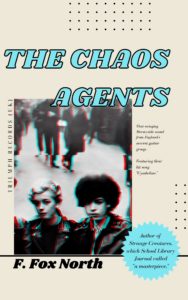Is it because you’ve been paid for it? Is it because someone tells you it’s good? Is it because of the way your audience shifts, sitting forward in their seats, their pupils flooding their eyes with black? Is it because you find yourself revisiting it yourself over and over again? Held captive by the story as if it didn’t come from you, as if you were channeling, as if you were merely a conduit for these people and their stories? Is it because, when you read it again – willingly – for the fifth or fifteenth or fiftieth time, you hear yourself say, Oh, yes, this was the book I’ve always needed?
I first became enamored with British mid-twentieth century music when I was eleven years old. I wasn’t then capable of writing a story like this. The notion to finally write a fab book first occurred to me in 2014, between my first two published novels, but it was so far afield from my genre – young adult science fiction – and popular tastes that I could not even begin to contemplate writing it. I set the idea aside for several other books, some which meant something to me, some which didn’t. I grew. I changed. And I began to realize that the story was much bigger than a fictionalization of two real boys navigating grief and identity in 1958. Baron and Eddie began to come to me through the ether, and with them, their children, their ghosts, their problems, their cats.
At last, in 2017, I set the first chapter to paper. I shared it with a friend. “Wow,” she said, “You must write amazing erotica. The sexual tension!” That chapter is shared here almost unchanged, save for my realization that Baron – of course! – is a diminutive guy, a pocket human.
(And I must say, writing these books has always been like that; I don’t make choices. I have realizations. The universe is already set out in perfect detail, and woe to the author who tries to change it. There is a guitar that is missing in this book by 2017. I tried to write it in. It was wrong, all wrong. I had to write an entire sequel for the characters to finally consent to sharing with me where it went.)
In 2017 I was under a deadline. I wrote here and there between other things. And, well, I didn’t know what to do with this book. It wasn’t for teenagers. It wasn’t like any other book I’d read. I got halfway through, and wrote several other books in the meantime. Sensible books. Potentially lucrative books.
But every winter something would happen to me. As the weather cooled, I’d don ‘70s concert tees and start playing The Hollies for my family. I’d play my guitar incessantly. “The winter of Baron Templeton,” my spouse would say, as the season inevitably turned to spring and I’d babbling about
the private sex lives of long-dead rock stars at dinner. In 2020, I realized I was not, for the first time, contractually bound by anything else. And I let my passions carry me. That winter, writing as though possessed, until I was pulling nine, ten hour days at the keyboard, until I gave myself a sciatica flare-up. I stayed up all night. I finished Baron’s story, and Naomi’s story, and Ed’s story, and Richard Charles’ story and Sid’s story, and poor, dear Cymbeline’s, but I still didn’t feel done. I learned to solder pick-ups and build guitars just so I could stay in the world a little longer. I mean, I built myself Baron’s Rickenbacker Combo 600, a guitar which does not exist. I thought that might satisfy. I sent the manuscript to my agent, and told myself it was over.
My agent loved it. She read it in one sitting, crying in a coffee shop, and when she was asked by a neighboring table what she was reading, she didn’t know what to say. She put it on submission and based on early interest – film and book – we felt optimistic. We waited for an offer. I told myself I
had done my work, for now.
And then the next winter, the same old mood returned. Baron, I was missing Baron. In between more sensible projects, I let myself write a short story about Baron. It became two short stories. It became a novella. It became a sequel, I reluctantly admitted to myself.
And meanwhile, the offer never came from trade publishing. My agent fielded phone calls, editors saying the book was “transcendent,” and “definitely had voice.” But they also didn’t know what to do with it. “Band books don’t sell,” “too raunchy,” “not a good fit for our list,” “I’m just not sure how to break it out.”
I’ve done this dance before with other books. I told myself I could pack them away, write something else, better targeted to the market. For whatever reason, I can’t with this book. No, that’s not true. I know the reason. The reason is Baron Templeton, borrowing my skin, my fingers, my time. Inhabiting me. Being bossy, a brat. But right.
You’re not going to put us down, now. You think I’m going to let you do all that?
No, no, Baron. Of course not.
Good.
The truth is, I can’t wait for you to read The Chaos Agents. I know it’s remarkable. I know it will change you. I had no choice but to share it with you – Baron, fucking Baron, would have it no other way.
Yours as the weather starts to cool and every winter thereafter,
Fox

